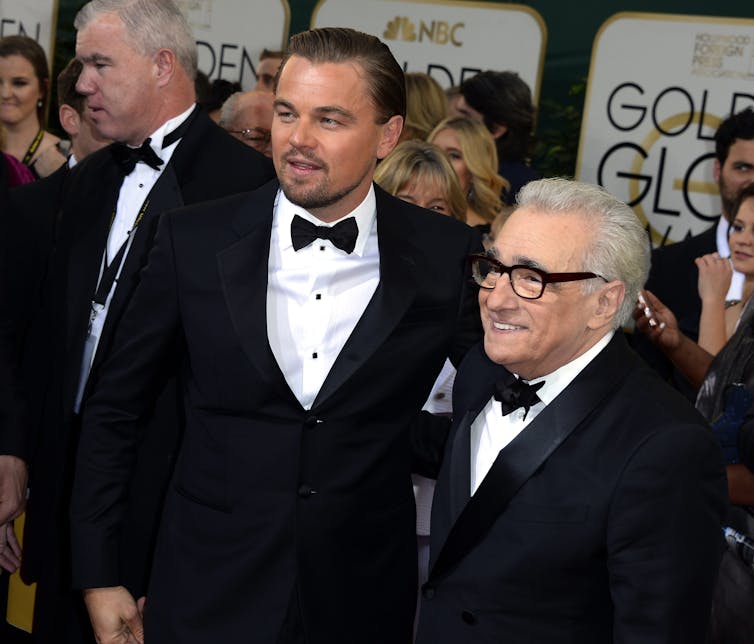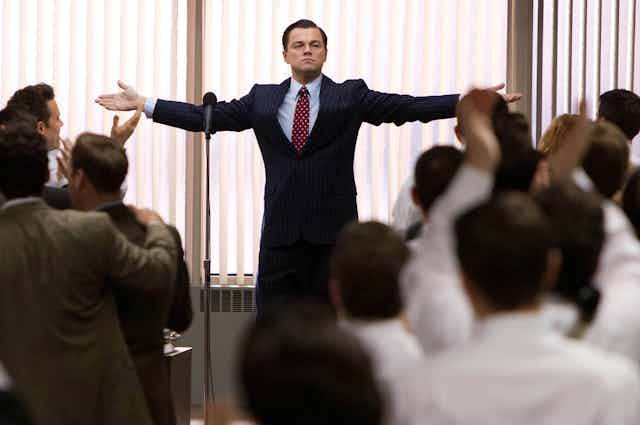The Wolf of Wall Street is Martin Scorsese’s Scarface – and that isn’t meant as a compliment.
I watched Brian De Palma’s 1983 film again recently. I had been looking forward to it: the Blu-ray edition on the nice TV with the surround sound. I had only seen it once before, and on pokier equipment.
I couldn’t wait to fully experience De Palma’s festival of 1980s excess, to wallow in the mire of bacchanalian indulgence that is Tony Montana’s cocaine-fuelled rise from Cuban-refugee-camp underpass-dwelling-street-thug, to international-drug-king-pin-mansion-dwelling street thug.
On re-watching, Scarface turned out to be a hollow disappointment for the same reasons The Wolf of Wall Street is. It turns out too much is actually more than enough – and excess quickly becomes wearing and depleting.
Yet characters finding joie de vivre in all the wrong places, with hedonistic content matched by formal amplitude on the director’s part, isn’t an inherently problematic approach to filmmaking. Far from it! See the films of Fellini, Almodóvar and Pasolini for some prime examples (there’s something in the water on the Mediterranean).

What most certainly is a problem is the way we are positioned in relation to the snorting, fornicating and otherwise un-PC behaviour of those wild and crazy guys in The Wolf of Wall Street. This film wants to be both a stinging indictment of late-capitalist excess, and to have a little fun with dwarf-tossing, hookers and quaaludes while we’re at it.
“But can’t we have both?” No Marty, I’m afraid we can’t.
What makes the film queasy viewing is that it’s Marty, and so it can’t be dismissed entirely. Not because of some auteurist deference to Scorsese’s place in The Pantheon of Directors, but because he is, for all of his foibles, a master filmmaker. The man is just brimming with cinema. All of film history and its accrued technique are at his disposal, and he uses it liberally.
Thrillingly. When he’s on message, it’s really something.
There’s a scene early in the film when Jordan Belfort, the stockbroker and lead character played by Leonardo DiCaprio, addresses the trading floor of his fledgling brokerage firm, Stratton Oakmont. By this point we’ve seen the young Belfort’s scruples, both financial and moral, tutored away by his first boss (Matthew McConaughey in a similar part to the one he played in Steven Soderbergh’s excellent 2012 film, Magic Mike)
And we’ve seen him humbled by the crash of ‘87, reduced to selling penny stocks out of a Long Island strip mall. These under-regulated, high profit margin stocks are the swampy ground upon which Belfort builds an empire. In this scene his vision finally crystallises.
Belfort announces that everyone has worked very hard at making (dirty) money that week, and so it’s time for some end-of-week shenanigans. Belfort himself has put up US$10,000 for one of the secretaries to shave her head. She’s agreeable, as she wants the money for a breast enlargement: “she’s already got C-cups, but she wants D-cups,” proclaims Belfort-as-carnival-barker.
The crowd goes nuts.
This kind of striving for the unnecessary extra cream is what they’re all about. The woman’s head is shaved, roughly, haphazardly. At this point Scorsese adds further layers. Into the room marches a male brass band in boxers and Y-fronts, then some lingerie-clad strippers … or are they prostitutes? Women are whores or whinging wives in this film.
The US$10,000 is thrust upon the shavee by hands eager to be occupied elsewhere. She was just a warm-up act, and she rises and walks gingerly through the room, her head a careless mess of patches and remnant strands.
A wide shot: shiny gold tickertape fills the air, the sound of the raucous room fades out — replaced by dark, eerie music — the motion slows and the lights cut in and out, and we hang there a moment contemplating the grim tableau. It’s a concise, artful distillation of a culture corrupted by capital.
There are one or two other moments in the film that work this way, but they are neutralised by the slack, bloated, ugly, pointless passages that run between them. Tedious sex-capades on luxury cars, yachts and planes; trying-to-do-shit-while-high jinks; and some particularly bald gay and disabled slurs.

Scorsese and screenwriter Terrance Winter might well protest that this is just Belfort’s subjectivity at play – the screenplay is based on the felon’s memoir, after all. This is Belfort’s story and this is how he sees and treats women. But there’s such a clear distinction between Scorsese’s authorial voice in the “indictment” passages (few and far between) when compared to the “hey let’s have some crazy fun with these fun crazy guys” (the bulk of the picture) that the satire defence can safely be struck off.
Scorsese is doing what Belfort did: slapping a veneer of respectability on some junk and peddling it to a public who might not be savvy enough to know the difference. It worked, too. He got my money, and I’m old enough to know better. Might Jordan Belfort posters replace Tony Montana posters on the bedrooms of undergraduate boys? There’s every chance.
For me, the valuable thing about The Wolf of Wall Street is how it made me feel about some of the other “Oscars Season” films. Unlike many of my contemporaries, Spike Jonze’s Her left me completely cold. I was amazed that a vision of the future that was so unambitious could be so utterly unconvincing, and found the central characters and their “relationships” pathetic (the bad kind of pathetic).
But you know what? At least it wasn’t poisonous, retrograde, macho bullshit. Its homeopathic innocuousness doesn’t bother me any more since a real black hat swaggered in to town.
Meanwhile, I thoroughly enjoyed David O. Russell’s American Hustle, and thought it had some transcendent moments. I’m thinking of Amy Adams and Christian Bale’s embrace in the spinning rack at the drycleaners as they fall for each other, and an unhinged Jennifer Lawrence cleaning the house angrily while belting out Wings’ Live and Let Die.
But a niggling voice held me back from gushing about it. The voice was my own, and it said: “sure it was good, and Russell can whiz a camera around, but he’s just the poor man’s Scorsese”. Now I wonder whether it isn’t the other way round.
Maybe my next viewing of Goodfellas will feel like a Scarface re-run.
See further Oscars 2014 coverage on The Conversation.

